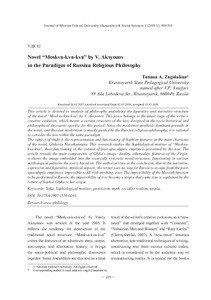Novel “Moskva-kva-kva” by V. Aksyonov in the Paradigm of Russian Religious Philosophy
Скачать файл:
URI (для ссылок/цитирований):
https://elib.sfu-kras.ru/handle/2311/70759Автор:
Zagidulina, Tatiana A.
Загидулина, Т.А.
Дата:
2018-03Журнал:
Журнал Сибирского федерального университета. Гуманитарные науки. Journal of Siberian Federal University. Humanities & Social Sciences;2018 11 (3)Аннотация:
This article is devoted to analysis of philosophy underlying the figurative and narrative structure of the novel “Moskva-kva-kva” by V. Aksyonov. This piece belongs to the latest stage of the writer’s creative evolution, which means a certain structure of the text, designed in the socio-historical and philosophical discourse, specific for this period. Since the modernist aesthetic dominant prevails in the novel, and Russian modernism is mostly guided by the Russian religious philosophy, it is rational to consider the text within the same paradigm.
The subject of study is the representation and functioning of Sophian features in the main character of the novel, Glykeria Novotkannaya. This research studies the Sophiological motives of “Moskva-kva-kva”, their functioning in the context of post-apocalyptic emptiness presented by the text. The article reveals the main components of Glyka’s image: duality, ethereality, features of the Virgin; it shows the image embedded into the scenically syncretic novel structure, functioning in various mythological patterns the text is based on. The author arrives at the conclusion, that in the narrative, expressive and figurative, mystical aspects, the writer sees no way for Russia to escape from the post-apocalyptic emptiness, impossible to fill with anything, ever. The impossibility of the Messiah function to be performed in Russia, the impossibility of it to become a utopia that came true is explained by the return of Sophia-Glyka to her origin Статья посвящена анализу философских оснований образной и сюжетной структуры романа
В. Аксенова «Москва-ква-ква». Произведение относится к последнему этапу творческой эволюции писателя, что позволяет говорить о характерном для этого периода конструировании
текста в рамках социально-исторического и философского дискурсов. В романе преобладает
модернистская эстетическая доминанта, а русский модернизм во многом ориентирован на русскую религиозную философию, поэтому текст можно рассматривать в этой парадигме.
Предметом исследования является репрезентация и функционирование софийных черт в образе главной героини романа – Гликерии Новотканной. В статье рассматриваются софиологические мотивы в романе «Москва-ква-ква», их функционирование в ситуации постапокалиптической пустоты, представленной в тексте. В статье выявлены основные составляющие
образа Глики: двойственность, пневматичность, богородичность, показано, как данный образ
встраивается в синкретичную в жанровом смысле структуру романа, как он функционирует в различных мифологических системах, на основе которых сконструирован текст. В статье сделан вывод о том, что на сюжетном, образно-выразительном, а также мистическом
уровне автор не видит путей выхода России из состояния постапокалиптической пустоты,
не способной заполнится ничем и никогда. Невозможность мессианской функции России и невозможность стать воплощенной утопией в данном тексте обосновываются сюжетным –
возвращением Софии-Глики к первоначалу

